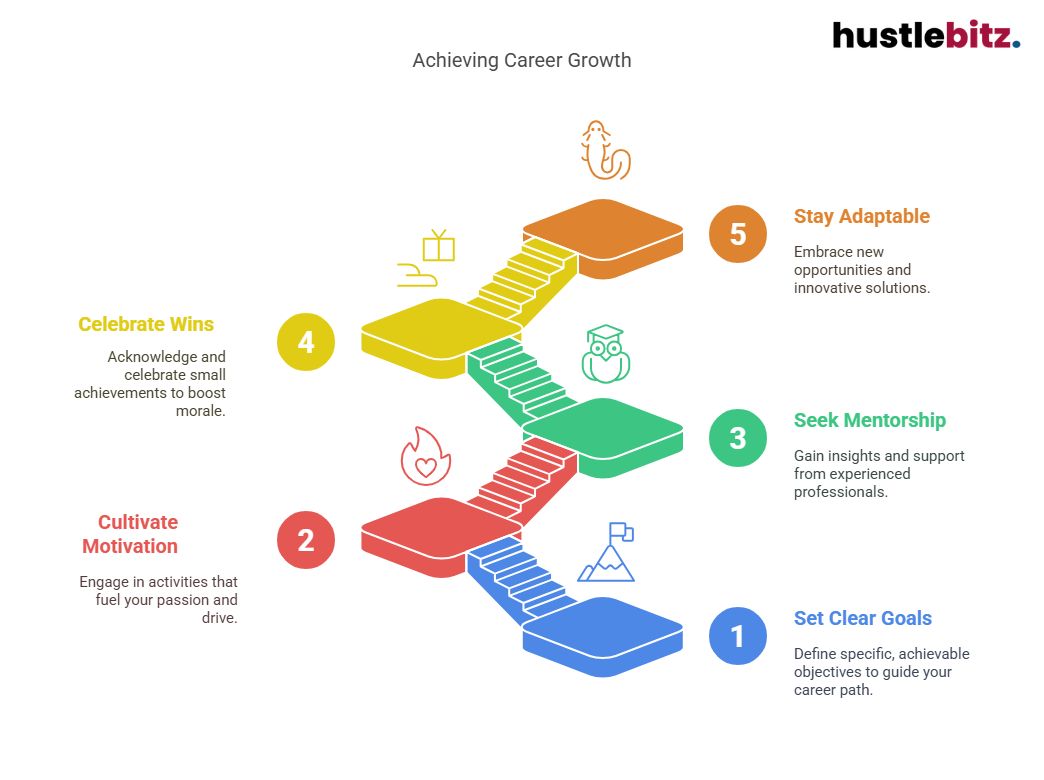Staying motivated in your career is crucial for ongoing growth and satisfaction. Set clear, achievable goals to maintain focus and gauge progress. Cultivate intrinsic motivation by pursuing your passions and seeking mentorship opportunities. Celebrate small wins to reinforce your achievements and morale. Adaptability is key; embrace change to discover new avenues for learning and growth. Additionally, create a positive workspace that boosts productivity and enhances well-being. Finally, prioritize work-life balance through self-care practices, ensuring sustained motivation. Exploring further will provide additional insights and strategies to help you thrive in your professional journey.
Key Takeaways
- Set clear and achievable goals to provide direction and measure progress in your career growth.
- Cultivate intrinsic motivation by pursuing your passions and interests for sustained engagement.
- Seek mentorship opportunities to gain insights and support for navigating your career path.
- Celebrate small wins to reinforce motivation and boost morale through positive reinforcement.
- Stay adaptable and open-minded to embrace new opportunities and innovative solutions in your career.

The Role of Motivation In Your Career

Motivation serves as a critical driving force in one’s career, influencing both performance and overall job satisfaction. It shapes the pursuit of career goals, acting as a catalyst for achieving objectives and fostering personal growth. Intrinsic motivation—stemming from internal desires such as passion for one’s work—often leads to sustained engagement and fulfillment. Conversely, external influences, such as recognition and rewards, can also propel individuals toward their aspirations.
Effective goal setting is essential in harnessing motivation. By establishing clear, achievable targets, professionals can develop a long-term vision that aligns with their career aspirations. This practice not only enhances focus but also aids in measuring progress along the journey. Additionally, motivation techniques, such as visualization and positive reinforcement, can help individuals stay committed to their objectives.
Self-discipline plays a pivotal role in maintaining motivation, particularly when faced with challenges. Overcoming obstacles requires resilience and a proactive approach, enabling professionals to navigate setbacks while remaining dedicated to their goals. Continuous professional development is essential for sustaining motivation, as it fosters new skills and knowledge that align with evolving career aspirations.
Ultimately, motivation is not a static quality; it requires ongoing cultivation through reflection and adjustment. By recognizing the interplay between intrinsic and extrinsic factors, individuals can better understand their motivations and harness them effectively to drive their careers forward. In this dynamic landscape, the ability to adapt and remain focused is crucial for long-term success.
Impact In Your Success

The influence of motivation on career success is profound, shaping not only individual performance but also overall professional growth and achievement. When individuals harness their motivation effectively, they unlock pathways to significant career milestones and personal achievements. This dynamic interplay fosters an environment where intrinsic rewards become evident, fueling further ambition and satisfaction.
To illustrate the impact of motivation on career success, consider the following key aspects:
- Goal Setting: Establishing clear and achievable objectives allows for structured progress, which is essential for professional growth.
- Skill Enhancement: A motivated individual actively seeks out opportunities to improve their skills, thus increasing their value in the workplace.
- Mentorship Relationships: Engaging with mentors can provide guidance and support, amplifying motivation and helping to navigate career paths effectively.
- Networking Opportunities: Building professional relationships can lead to new opportunities that propel one’s career forward.
Additionally, feedback mechanisms and self-assessment tools are crucial in this journey. They provide insight into areas of strength and opportunities for improvement, enabling individuals to adapt and refine their strategies.
Staying Motivated
Maintaining a consistent drive in one’s career requires a proactive approach to personal and professional development. To stay motivated, it is essential to engage in effective goal setting that aligns with your ambitions. This process not only fosters intrinsic motivation but also clarifies your purpose, making it easier to overcome obstacles that arise along your journey.
Utilizing self-reflection techniques can help you evaluate your progress and identify areas for improvement, while also reinforcing your commitment to personal growth. Engaging in mentorship opportunities provides guidance and inspiration, further enhancing your motivation. Additionally, implementing networking strategies can open doors to new experiences and insights, invigorating your professional journey.
Effective time management is key to balancing various aspects of career development. By allocating time for personal projects, skill development, and networking, you can remain focused and driven. Below is a table summarizing essential strategies for staying motivated:
| Strategy | Description | Benefits |
| Goal Setting | Define clear, achievable objectives | Provides direction and focus |
| Intrinsic Motivation | Foster internal passion for your work | Sustains long-term engagement |
| Mentorship Opportunities | Seek guidance from experienced professionals | Offers support and insights |
| Networking Strategies | Build relationships in your industry | Expands opportunities |
| Self Reflection Techniques | Regularly assess your progress | Enhances self-awareness |
Celebrate Small Wins

Acknowledging and celebrating small wins can significantly enhance your overall motivation and sense of accomplishment in your career journey. Recognizing these small victories fosters a positive mindset and encourages continuous growth. Implementing effective recognition strategies can transform your approach to goal setting and personal milestones.
Here are four practical ways to celebrate small wins:
- Progress Tracking: Regularly monitor your achievements, no matter how minor. Use tools like spreadsheets or apps to visualize your progress, which can serve as a motivational reminder of how far you’ve come.
- Gratitude Practices: Take time to express gratitude for your accomplishments. Reflective journaling can help you articulate what you’ve achieved and why it matters, reinforcing the significance of each small win.
- Positive Reinforcement: Reward yourself for achieving small milestones. This could be as simple as taking a break, treating yourself to a favorite snack, or enjoying a leisurely activity.
- Team Celebrations: When working within a group, initiate team celebrations for collective small victories. This not only boosts morale but also strengthens team dynamics, fostering a culture of appreciation and support.
Stay Adaptable and Open-Minded

Staying adaptable and open-minded in your career can lead to new opportunities and innovative solutions in an ever-changing work environment. As industries evolve, the ability to embrace change becomes crucial for career flexibility. This mindset shift encourages professionals to explore learning opportunities that may initially seem outside their expertise. By diversifying skills, individuals enhance their value and adaptability, making them more equipped to tackle unexpected challenges.
Embracing change fosters innovative thinking, allowing professionals to approach problems from different angles. This adaptability not only supports personal growth but also contributes to resilience building, as it prepares individuals to navigate uncertainties with confidence. A significant aspect of staying adaptable involves actively seeking feedback reception, which can provide insights that inform your career path. Constructive criticism can illuminate areas for improvement, prompting skill diversification that aligns with emerging industry needs.
Moreover, effective networking strategies are essential in maintaining an adaptable mindset. Engaging with diverse professionals can expose you to new ideas and perspectives, further enriching your career journey. Networking can also help identify trends and opportunities that others may overlook, positioning you advantageously in your field.
Create a Positive Workspace

Cultivating a positive workspace is essential for enhancing productivity and overall job satisfaction. A thoughtfully designed workspace contributes not only to individual performance but also fosters effective team collaboration.
To create an inviting and efficient environment, consider the following elements:
- Workspace Design: Prioritize ergonomic furniture to ensure comfort during long hours. This includes adjustable chairs and desks that support proper posture, reducing fatigue and promoting focus.
- Environmental Factors: Incorporate color psychology into your workspace design. Colors like blue and green can promote calmness, while yellows and oranges can inspire creativity. Additionally, ensure adequate lighting and implement noise reduction strategies to minimize distractions.
- Personal Organization: Encourage personal organization through designated storage solutions. Clutter-free spaces can significantly enhance clarity of thought and reduce stress, allowing for improved concentration on tasks.
- Visual Inspiration: Enhance the workspace with visual inspiration, such as artwork or motivational quotes. This can invigorate the atmosphere, making it more engaging and stimulating for creativity.
Balance Work and Life
A positive workspace can lay the foundation for maintaining a healthy balance between work and personal life, which is vital for long-term career satisfaction and well-being. Achieving work-life harmony requires intentional efforts in various areas, including time management and boundary setting. By establishing clear boundaries between work and personal time, individuals can prevent burnout and enhance their productivity.
Integrating self-care practices into your daily routine is essential for personal development and maintaining a healthy balance. This may include regular exercise, mindfulness activities, or simply ensuring you take breaks throughout the day. Leisure activities, whether they involve hobbies or quality time with family, play a crucial role in stress management and rejuvenation.
Family support is another significant aspect that contributes to work-life harmony. A supportive family environment can help mitigate stress and encourage open communication about work commitments. This support system allows for better planning and prioritization of both work and personal responsibilities.
Moreover, adopting productivity tips can streamline tasks and create more free time for leisure. Effective time management techniques, such as the Pomodoro Technique or prioritizing tasks, can lead to increased efficiency and reduced working hours, ultimately fostering a more balanced lifestyle.
Final Thoughts
Staying motivated to grow in your career requires a balance of goal setting, continuous self-reflection, and adaptability. By cultivating intrinsic motivation, seeking mentorship, and celebrating small wins, you can maintain your drive even during challenging times. Creating a positive workspace and prioritizing work-life balance further supports sustained motivation and well-being. Remember, career growth is a journey, and staying open to new opportunities, while managing your time and energy effectively, will help you achieve long-term success and fulfillment in your professional life.




